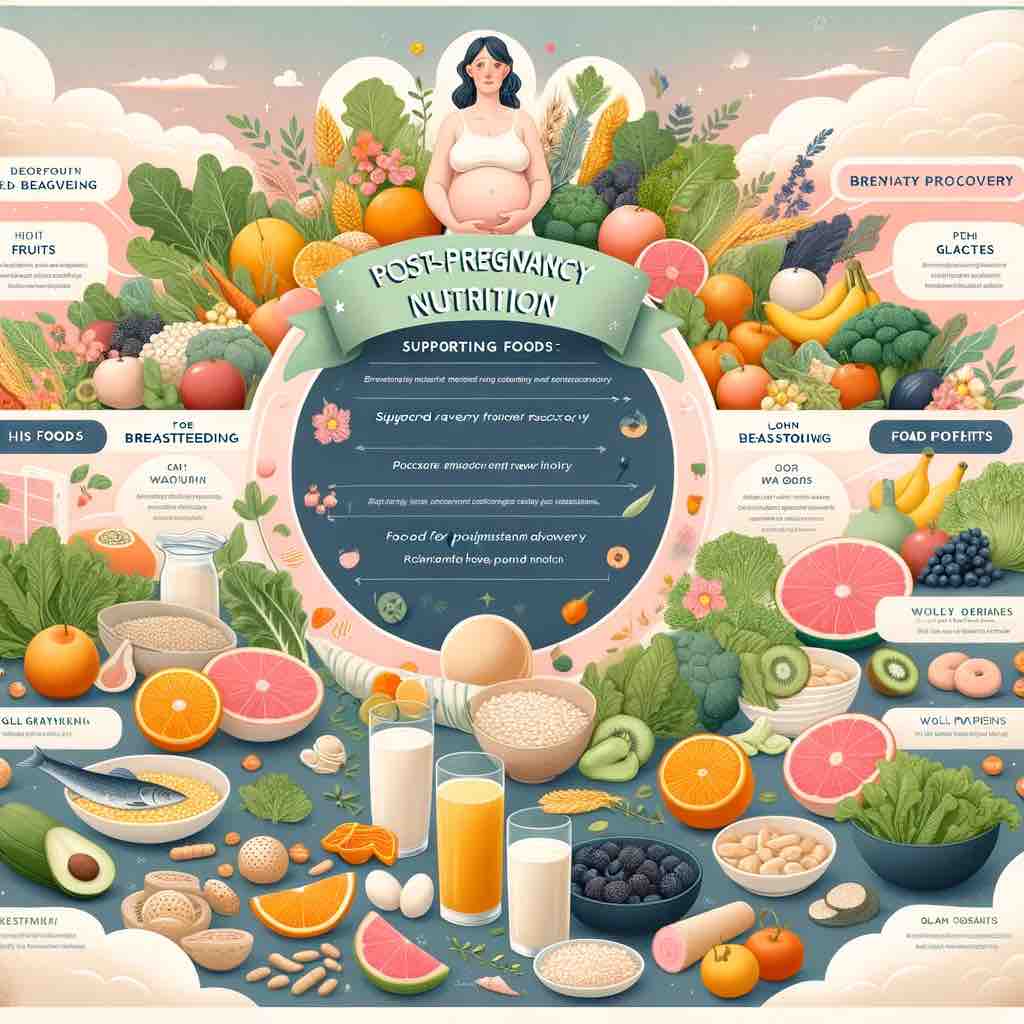
Entering the Postpartum Phase
Congratulations on the arrival of your baby! The post-pregnancy period, also known as the postpartum phase, is a time of significant change, both emotionally and physically. As you adjust to life with your new baby, it’s crucial to focus on your nutritional needs to support your recovery and, if you choose to, breastfeeding. Let’s delve into the specifics of post-pregnancy nutrition, highlighting key nutrients, dietary strategies, and tips for a healthy recovery.
Nutritional Needs for Postpartum Recovery
- Caloric Needs: If you’re breastfeeding, you’ll need about 500 extra calories per day. Even if you’re not breastfeeding, your body needs additional nutrients for recovery.
- Protein: Essential for healing and rebuilding tissues. Include lean meats, poultry, fish, dairy, legumes, and nuts in your diet.
- Iron: To replenish iron stores, especially if you experienced significant blood loss during delivery. Continue with iron-rich foods and consult with your healthcare provider about supplementation.
- Calcium and Vitamin D: Important for bone health, especially if breastfeeding. Dairy products, fortified plant-based milks, leafy greens, and sunlight exposure are key.
- Omega-3 Fatty Acids: Beneficial for mood stabilization and baby’s brain development if breastfeeding. Include sources like fatty fish, flaxseeds, and walnuts.
- Fiber: Essential for bowel health, especially if you experience postpartum constipation. Whole grains, fruits, vegetables, and legumes are excellent sources.
Hydration: A Key Factor
- Water: Crucial for milk production and overall health. Aim for at least 8-10 glasses per day, more if breastfeeding.
- Limiting Caffeine: While moderate caffeine intake is generally safe during breastfeeding, excessive amounts can affect the baby.
Managing Weight Post-Pregnancy
- Gradual Weight Loss: Rapid weight loss can be harmful, especially if breastfeeding. A gradual approach is healthier and more sustainable.
- Balanced Diet: Focus on nutrient-dense foods rather than restrictive dieting.
- Physical Activity: Incorporate gentle exercises as recommended by your healthcare provider.
Nutrition While Breastfeeding
- Breast Milk Composition: Your diet influences the nutrient content of your breast milk.
- Vitamins and Supplements: Continue prenatal vitamins as advised, especially if breastfeeding. Additional supplements like vitamin D may be necessary.
Common Dietary Concerns in Postpartum
- Postpartum Depression: Nutritional factors, such as low levels of omega-3 fatty acids, can influence mood. A balanced diet can support mental health.
- Energy Levels: Nutrient-rich foods, combined with adequate rest, help maintain energy levels during the demanding postpartum period.
Nutrition for Healing
- Healing Foods: Foods rich in vitamins C and E, zinc, and protein can aid in the healing process, especially if you had a cesarean section or experienced tearing.
Practical Tips for Busy New Parents
- Meal Planning: Prepare and freeze meals ahead of time or consider healthy meal delivery services.
- Snacking Smartly: Keep healthy snacks like fruits, nuts, and yogurt on hand for quick nutrition.
Building a Support Network
- Seeking Help: Don’t hesitate to ask for or accept help with meal preparation and grocery shopping.
Next Steps
Remember, your health is as important as your baby’s. Regular check-ins with your healthcare provider are essential to address any nutritional or health concerns during the postpartum period.
Up Next: Transitioning Back to Regular Diet
In our next post, we’ll explore how to transition back to your regular diet after the postpartum period, focusing on long-term nutritional health and wellness. Stay with us as we continue to support you through this incredible journey of motherhood.
FAQs for Post-Pregnancy Nutrition
- How many extra calories do I need if I’m breastfeeding?
- If you’re breastfeeding, you generally need about 500 extra calories per day to fuel milk production and maintain your energy.
- What are the best protein sources for postpartum recovery?
- Lean meats, poultry, fish, dairy products, legumes, nuts, and seeds are excellent protein sources, crucial for tissue repair and recovery.
- Is it necessary to continue taking prenatal vitamins postpartum?
- Yes, it’s often recommended to continue prenatal vitamins, especially if breastfeeding, to ensure you’re getting essential nutrients like iron, calcium, and vitamins.
- How can I manage weight safely after pregnancy?
- Focus on a balanced diet and gradual weight loss. Rapid weight loss, especially when breastfeeding, is not advisable. Incorporate regular, gentle physical activity as recommended by your healthcare provider.
- Can my diet affect the quality of my breast milk?
- Yes, your diet can influence the nutrient content of your breast milk. A balanced diet ensures your milk is nutritionally rich for your baby.
- What foods should I eat to help with postpartum healing?
- Foods rich in vitamins C and E, zinc, and protein, such as citrus fruits, leafy greens, nuts, and lean meats, can aid in the healing process.
- How much water should I drink during the postpartum period?
- Aim for at least 8-10 glasses of water per day, more if you are breastfeeding, to stay well-hydrated and support milk production.
- What are some healthy snack ideas for new moms?
- Opt for nutrient-rich snacks like fruits, yogurt, nuts, whole grain crackers, and cheese. These provide essential nutrients and help maintain energy levels.
- How can I manage postpartum constipation?
- Increase your fiber intake with foods like whole grains, fruits, and vegetables, and ensure you’re drinking plenty of fluids. Regular physical activity also helps.
- Can nutrition help with postpartum depression?
- While nutrition alone cannot treat postpartum depression, a balanced diet can support overall mental health. Foods rich in omega-3 fatty acids, such as fatty fish, flaxseeds, and walnuts, are particularly beneficial.
Blog Tags for the Post
postpartum nutrition, breastfeeding diet, healthy eating post-pregnancy, postpartum weight management, postpartum recovery, hydration for new moms, breastfeeding calories, protein sources for new mothers, postpartum healing foods, managing postpartum constipation, post-pregnancy mental health, balanced diet for new moms, nutritional supplements postpartum, healthy snacks for new parents, postpartum physical activity









